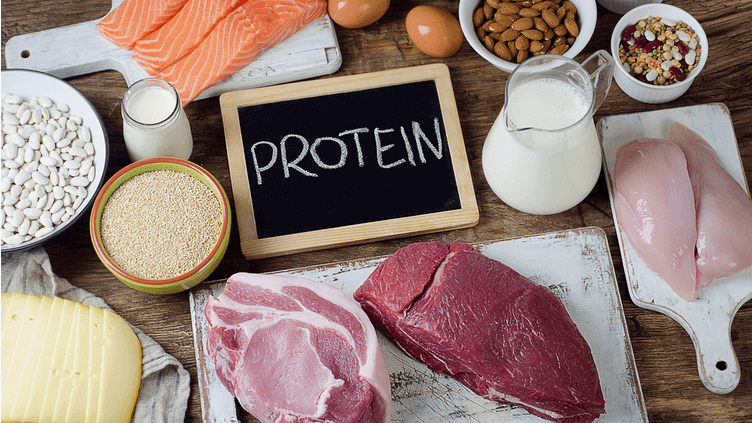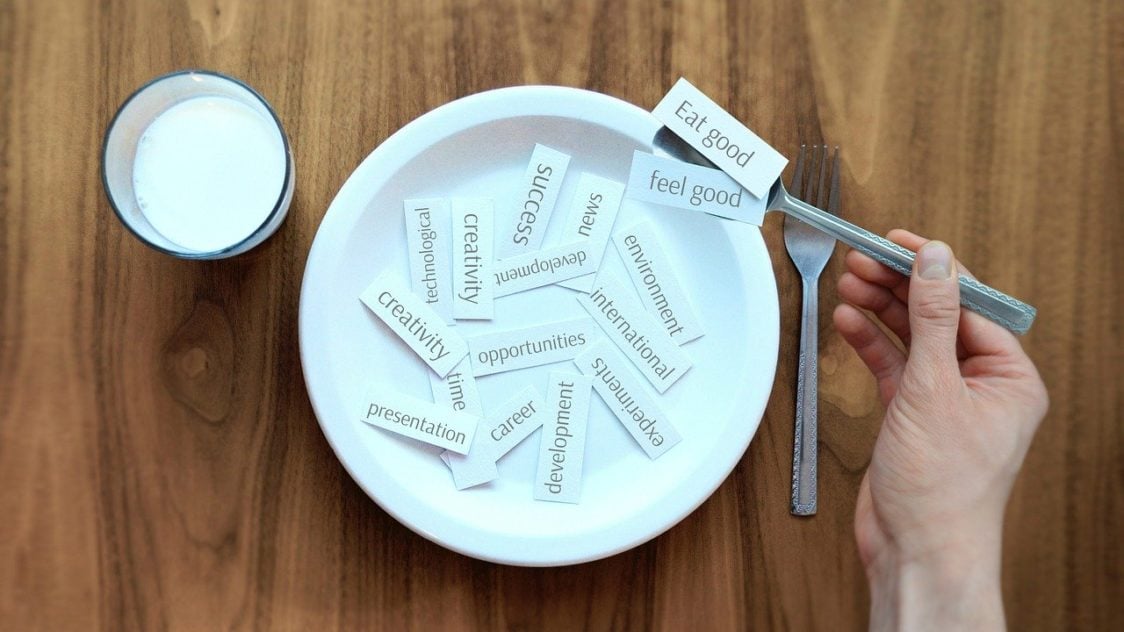There are many factors behind the failure to lose weight and believe me; it’s not always just junk food or lack of exercise. Learn what can cause your faux pas when losing weight, and how easily you can change it!
You do not intake enough protein

Just as proteins play a role in gaining muscle mass, they also play an important role in the weight loss process. In several ways:
High protein intake increases metabolism
The thermal effect of food (TEF) is the process of digesting, absorbing and metabolising food, which occurs by taking in calories and then burning them. From the group of macronutrients, it is precisely the proteins that contribute the most to TEF. In percentage terms, proteins have about 20 to 30% thermal effect on digestion, with carbohydrates 5-10% and fats only 0-3%. High protein intake also helps prevent metabolic slowdown, which is a common side effect of weight loss. Besides, it helps prevent weight gain. Thus, high protein intake has been shown to increase metabolism as well as calories burned by 80 kcal to 100 kcal per day.

Proteins change the levels of weight-regulating hormones
If someone tells you that the whole process of losing weight actually takes place only in your head, they are to some extent right. Bodyweight is directly connected to the brain; specifically, its part called the hypothalamus. This is where weight-regulating hormones gather and process various types of information, including what, when and how much you should eat. Higher protein intake has been shown to increase satiety-inducing hormone levels, such as GLP-1, YY peptides, or cholecystokinin, which also lowers the level of the hormone ghrelin, the so-called hunger hormone.
Proteins help prevent muscle loss
Loss of muscle mass is a side effect of weight loss. It occurs mainly if you do not include strength training in your impoverished process, or if you do not receive enough protein. They support the growth of muscles, which are directly responsible for the speed of metabolism. The less muscle you have, the slower your metabolism and the loss of unwanted fat stores will be more difficult. In other words, you burn much fewer calories. Consuming large amounts of protein can reduce muscle loss, which should help maintain a higher metabolic rate with body fat loss.

Solution
If you are really serious about losing weight, you should focus on higher protein intake. The average adult needs a minimum of 0.8 grams of protein per kilogram of body weight per day. In endurance athletes, the dose is higher, 1.2 to 1.4 g of protein per 1 kg of weight, and bodybuilders or bodybuilders, in turn, receive an average of 1.6 to 1.7 g of protein. [17]
Protein sources are genuinely scarce. You can find them in lean meat, fish, eggs, dairy products or legumes. If you want to have your protein intake under control, you can also reach after supplementation in the form of protein powders or drinks, which state the exact number of proteins taken per dose.
You don’t count your calorie intake
Calories are units of energy obtained from food that we use for several processes in the body. One of the most important factors in losing weight is tracking how many calories you intake and, conversely, how many calories you burn. If your goal is to lose weight, you should burn more calories than you intake during the day.
The first step in calculating your caloric deficit is to know how many calories you consume per day, ie your total daily energy expenditure (TDEE). If you know this number, the second step is to determine your energy intake so that it does not exceed your TDEE. It consists of three basic parts:
- basal metabolism (BMR) – BMR refers to the calories that your body burns at rest during vital functions such as breathing.
- thermal effect of food – These are the calories that your body burns by digesting, absorbing and metabolizing food.
- thermogenic physical activity – Calories that you burn during any physical activity, such as sports, strengthening or even doing housework.
Solution
So if you set your calorie deficit correctly, your weight loss will be much easier. It is also true that the lower the caloric deficit, the slower the weight loss. At the same time, the slower the weight loss, the healthier and more effective it is.
See an example of achieving a weight loss of 0.45 kg per week:
daily intake 2000 kcal – if you burn 2,500 kcal daily = your caloric deficit is 500 kcal = weekly 3,500 kcal = – 0.45 kg per week .
How to calculate calorie intake? The easiest and most comfortable way is to entrust yourself to calorie charts or calculators. They will calculate your daily energy intake. Some calculators offer the ability to set a goal, whether you want to lose weight or gain weight, and based on that, you can set in advance, for example, how many calories you should take to achieve a caloric deficit.
You don’t do weights
You can burn a lot of calories with cardio training, but with this type of exercise, building muscle mass is more complicated. But did you know that 0.45 g of muscle can burn 10 to 20 calories a day, while 0.45 g of fat burns only 5 kcal? [8] Therefore, you should definitely not neglect strength training! Strength training increases the long-term burning of calories at rest (BMR), which results in higher weight reduction. Lifting weights can also help prevent metabolic slowdowns and ensure your body stays toned and muscular.

Solution
If your goal is to lose weight and your training plan consists only of cardio exercises, you should add weight lifting to it. Remember, however, that you should start with lower weights to avoid injury or unnecessary overtraining. If you do not know what ratio of cardio and strength training, you should incorporate into your training plan, contact a professional.
You eat a lot of simple sugars
Flavoured drinks or juices are often sweetened with fructose, a type of simple sugar. Unlike glucose, our body cannot process it so well. Some of the fructose is processed in the liver and the rest is stored in the body as fat stores. Therefore, excessive consumption of fructose can cause weight gain. [1] [9] Consequently, there is an increase in cholesterol levels, fat storage around body organs and many other health complications [8], such as:
- more frequent development of tooth decay
- the onset of obesity
- the onset of type 2 diabetes
- increased risk of cardiovascular disease
- development of yeast infections
- acne and skin deterioration

However, you should not overdo it with other types of refined sugar. Refined sugar is high in calories, but has no additional nutritional benefit. It contains the so-called empty calories because it contains no proteins, fats, fibre or any vitamins, minerals or antioxidants.
Solution
If you want to lose weight, you should consider replacing classic sugar with more healthy natural sweeteners, such as agave syrup, honey, stevia or xylitol.
You don’t get enough sleep
Lack of sleep can also negatively affect your body weight. Poor and non-quality sleep is associated with a higher body mass index (BMI), and thus a subsequent weight gain. Experiencing sleep deprivation can affect the secretion of the stress hormone cortisol, which regulates your appetite. Several studies have also shown that people suffering from sleep deprivation have an increased appetite. This is probably due to the impact of sleep on two important hormones – ghrelin and leptin. Ghrelin signals hunger in the brain, andleptin signals hunger and signals fullness. If you do not get enough sleep, your body produces more ghrelin and less leptin, so your appetite will increase. Fatigue can also cause you to skip workouts, so you burn fewer calories a day.

Solution
Treat yourself to a sufficient amount of quality and undisturbed sleep. Its length is individual and depends on the person, his physical condition and many other factors. On average, quality sleep should last from 7 to 9 hours. If you can’t reach the sleep limit at night, you can catch up with him during the day, for example in the afternoon siesta.
You are not properly hydrated
Sufficient hydration is key to many processes in our body. Weight loss is no exception. The main symptoms of dehydration include fatigue, lethargy and headache, so your energy levels suffer, and you will have no desire to exercise. By maintaining optimal hydration, you will increase the level of energy and ensure the healthy running of your body.
Besides, fluid intake improves digestion and hydration through clean water helps to remove harmful substances from the body more effectively. Drinking water also reduces fluid retention and appetite. It is not for nothing that it is said that hunger is disguised as thirst. If you feel hungry, try drinking a glass of pure water before you eat. You will be surprised how many times your hunger and appetite pass.

Solution
The solution to this problem is straightforward – follow the drinking regime! So how much water should you drink a day? It all depends on the person, his predisposition and physical activity, but on average women should drink about 2.7 litres of water and men 3.7 litres of water per day.
You do not follow a conscious diet
Conscious eating is a sensitivity-based technique that gives you control over your eating habits.This will avoid emotional eating or overeating due to stress. This is because conscious eating has been shown to promote weight loss, reduce overeating and help you feel better.

Solution
In order to achieve conscious eating, you should follow these 7 principles:
- Eat slowly – it will help improve your digestion.
- Chew every bite well.
- Sit at the table to eat – never eat standing, give yourself enough peace and comfort while eating.
- Do not eat directly from the package – the food on a plate or in a bowl looks more aesthetic and is guaranteed to taste better.
- If you feel full, put the food aside – the goal of eating is not to overeat, but to achieve a feeling of fullness. If you reach it, you should not continue eating.
- Get rid of distractions – when eating, you should focus only on food, so put away your cell phones, laptops, turn off the TV and enjoy your meal.
- Pay attention to the consistency, smell and taste of the food – the food will take on a completely different dimension and you will recognize tastes or smells that you were not aware of before.
You have unrealistic expectations
Weight loss is a complex and lengthy process, the results of which are not visible after a few days, but require weeks or months of effort. Many people, therefore, tend to lose patience before reaching a specific goal. The reason may also be that they have set unachievable goals. If you aim to lose a certain number of kilograms in the shortest possible time, you will probably not succeed. At the beginning of your weight loss journey, you will lose more kilograms in a short period of time, but this process will stop over time, the rate of weight loss will slow down, and you will no longer see such marked changes.
Another unrealistic goal may be to try to look like a specific fitness model. Not everyone can look like a magazine, and the people presented in this way have years of hard work behind them, which you will not catch up within a few months.
Solution
Set realistic, clear and guaranteed achievable goals. Find out how many kilograms you should lose per week to achieve a specific goal healthily, and what tools you will need to achieve it. If you are unsure, consult a nutrition and exercise expert.
You are stressed
For many people, stress can have a direct effect on their weight. If the levels of the stress hormone cortisol are high, it can lead to weight gain. This is because cortisol slows down the metabolism and increases the appetite for sugar, which is stored in the body in the form of belly fat during excessive intake. In addition, stress causes unhealthy habits such as:
- emotional stress
- less exercise
- appetite for junk food
- less sleep
- skipping food

Solution
Identify the stimuli that are causing you stress and try to eliminate them. You can also try breathing exercises or yoga, which has proven positive effects on reducing stress.
When losing weight, it is important to realise that it is primarily a permanent change in lifestyle, and by changing a single factor, you will not achieve the desired goal. Therefore, try to look at what you are doing on your way to the “slimmer self”, and you will find that everything is only in your hands. If something doesn’t work, you need to change it! We believe that our article will also help you with this.
Do you want your friends to know about these tips? Feel free to support the article by sharing it.


